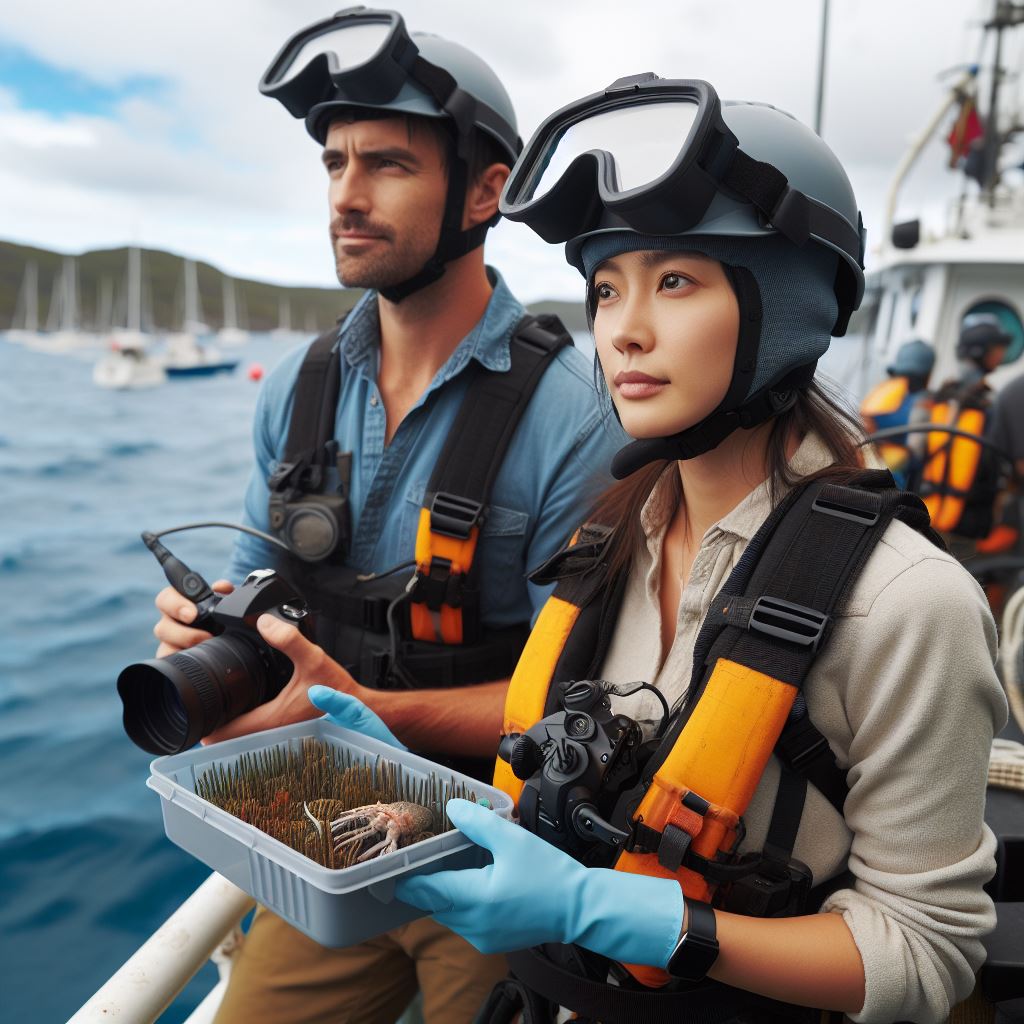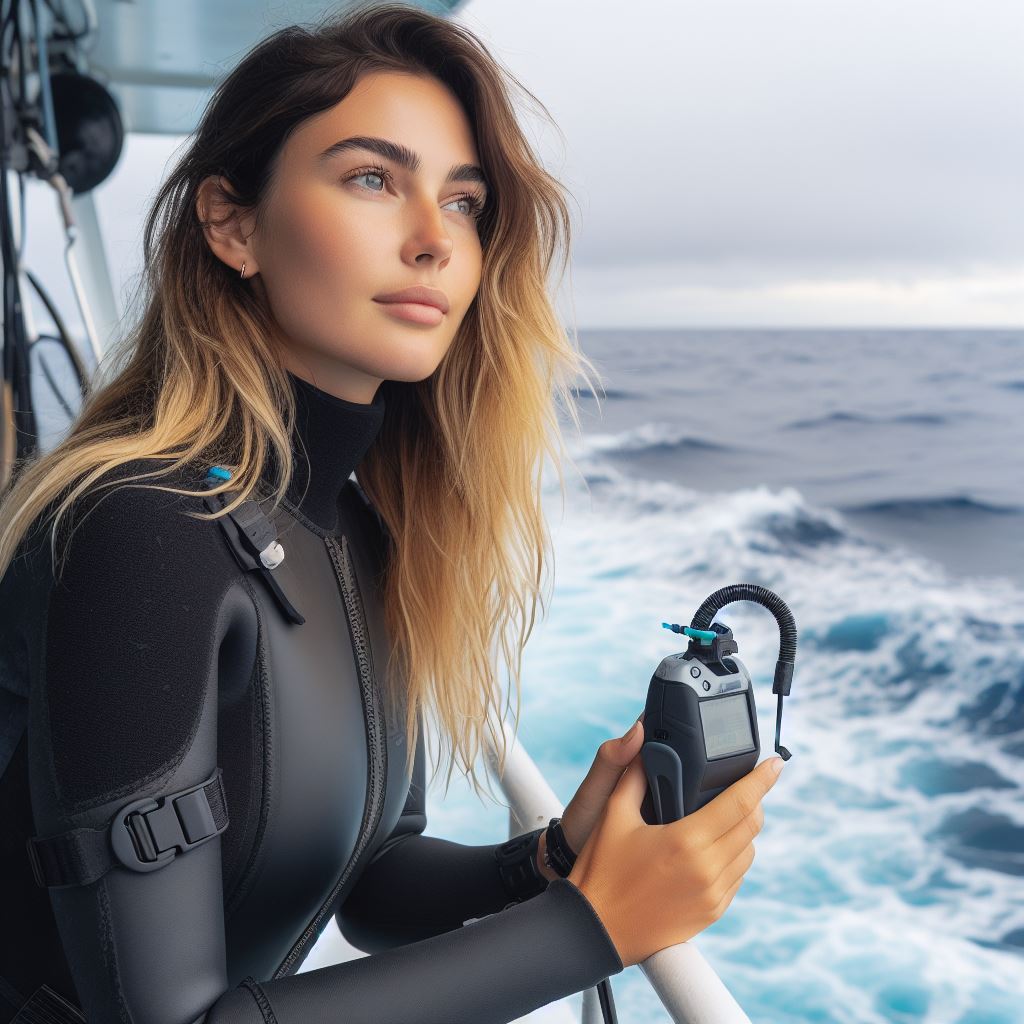Introduction
Importance of Marine Biology Internships
As the field of marine biology continues to grow, internships have become more crucial than ever.
These hands-on opportunities allow aspiring marine biologists to gain practical experience, develop essential skills, and make meaningful contributions to the field.
Australia, with its vast coastline and diverse marine ecosystems, has become a hot spot for marine biology internships. This country offers a unique environment for individuals interested in studying marine life and conservation efforts.
Growing interest in marine biology internships in Australia
There are several reasons for the growing interest in marine biology internships in Australia. First, Australia’s rich biodiversity attracts researchers and students from all over the world.
The Great Barrier Reef, for example, is a renowned marine ecosystem that provides a multitude of research and learning opportunities.
Additionally, Australia has a strong emphasis on marine conservation and sustainability. Interns can actively participate in projects aimed at protecting endangered species, restoring coral reefs, and implementing sustainable fishing practices.
Furthermore, internships in Australia offer the chance to work alongside reputable marine biologists and organizations.
This provides valuable networking opportunities and the ability to learn from experts in the field.
Basically, marine biology internships in Australia hold immense importance in providing aspiring marine biologists with hands-on experience, exposure to diverse ecosystems, and the opportunity to contribute to vital conservation efforts.
These internships serve as a steppingstone for future success in the field.
Overview of Marine Biology Internships in Australia
Various organizations and institutes offering internships
- Great Barrier Reef Marine Park Authority
- Australian Institute of Marine Science
- James Cook University
- University of Queensland
- University of Sydney
Wide range of internship opportunities available
- Coral reef ecology and conservation
- Marine mammal research and conservation
- Marine biodiversity and ecosystem studies
- Marine pollution and environmental monitoring
- Climate change impacts on marine ecosystems
Benefits of choosing Australia for marine biology internships
- Rich and diverse marine life
- Opportunity to work in world-renowned marine research facilities
- Access to unique and pristine marine environments
- Collaboration with leading experts and scientists in the field
- Possibility of contributing to groundbreaking research and conservation projects
- Enhanced understanding of global marine issues
- Chance to develop practical skills and gain hands-on experience
- Networking opportunities with professionals and peers
- Immersion in vibrant Australian culture and lifestyle
- Potential for career advancement and future job prospects
Various organizations and institutes offering internships
Marine biology internships in Australia offer a unique opportunity for students and aspiring marine biologists to gain invaluable hands-on experience and contribute to cutting-edge research and conservation efforts.
With a wide range of internship opportunities available and various organizations and institutes offering these programs, Australia is a top destination for those interested in marine biology.
Wide range of internship opportunities available
One of the key advantages of choosing Australia for marine biology internships is the country’s rich and diverse marine ecosystems. Australia is home to the world-famous Great Barrier Reef, which provides a unique setting for studying coral reef ecology and conservation.
Interns can also explore other marine environments such as mangroves, seagrass beds, and kelp forests, allowing them to gain a comprehensive understanding of different marine ecosystems.
In addition to the stunning natural beauty, Australia is also known for its world-renowned marine research facilities. Interns have the opportunity to work alongside leading experts and scientists in the field, learning from their expertise and gaining insights into the latest research and conservation practices.
This collaboration not only enhances interns’ knowledge and skills but also opens doors for future academic and professional opportunities.
Benefits of choosing Australia for marine biology internships
Furthermore, marine biology internships in Australia provide the chance to contribute to groundbreaking research and conservation projects.
Interns may work on projects related to marine mammal research, marine pollution monitoring, climate change impacts on marine ecosystems, or marine biodiversity studies.
This hands-on involvement allows interns to make a real difference and contribute to the understanding and preservation of marine life.
Internships in Australia also offer numerous benefits for personal and professional development. Interns gain practical skills through fieldwork, laboratory work, data collection, and analysis.
They also have the opportunity to present their findings at conferences or publish their work, enhancing their resume and future career prospects.
Additionally, networking opportunities with professionals and peers in the field create valuable connections and potential collaborations.
Lastly, marine biology internships in Australia provide a chance to immerse oneself in the vibrant Australian culture and lifestyle.
Interns can explore the country’s beautiful landscapes, experience indigenous culture, and encounter unique wildlife. This cultural immersion adds a unique dimension to the internship experience and creates lasting memories.
Your Personalized Career Strategy
Unlock your potential with tailored career consulting. Get clear, actionable steps designed for your success. Start now!
Get StartedTherefore, marine biology internships in Australia offer a plethora of opportunities for students and marine enthusiasts.
With its diverse marine ecosystems, world-class research facilities, and the chance to contribute to impactful projects, Australia provides an enriching and rewarding experience for those pursuing a career in marine biology.
Eligibility and Application Process
Academic and experiential requirements
Aspiring marine biology interns in Australia must meet certain academic and experiential qualifications.
- Applicants should have a strong background in biology, particularly in marine sciences.
- It is recommended to have completed coursework or have experience in marine ecology, oceanography, and related fields.
- Some internships may require specific knowledge or skills, such as scuba diving certification.
Visa and legal considerations for international students
International students must consider visa and legal requirements before applying for marine biology internships in Australia.
- Students should have a valid passport that is not expiring within the next six months.
- Depending on the length of the internship, students may need to apply for a student visa.
- It is important to research and understand the visa application process and any associated fees.
Step-by-step application process for marine biology internships in Australia
Applying for marine biology internships in Australia involves several steps, which can vary depending on the organization.
- Research different internship opportunities and organizations to find the best fit for your interests and goals.
- Review the application requirements and ensure that you meet all the necessary qualifications.
- Prepare your application materials, including a resume, cover letter, and any additional documents or certifications.
- Submit your application online or through the designated application portal.
- Some internships may require additional steps, such as interviews or reference letters.
- Stay proactive and follow up on your application to demonstrate your commitment and interest.
- If accepted, complete any necessary paperwork and provide any additional documentation requested.
- Make necessary arrangements for travel, accommodations, and any visa requirements.
- Prepare for your internship by researching the location, familiarizing yourself with the organization, and setting goals for your experience.
- Enjoy your marine biology internship in Australia and make the most of the opportunities for learning and growth.
Types of Marine Biology Internships in Australia
Research-based internships
Research-based internships in marine biology allow students to engage in hands-on fieldwork and data collection.
These internships provide valuable experience in scientific research methods and techniques. Interns may have the opportunity to work alongside experienced researchers in various research projects.
The main focus of these internships is to collect data that can contribute to the understanding of marine ecosystems and species.
Interns may be involved in conducting surveys, monitoring biodiversity, and analyzing environmental factors affecting marine life. The data collected during these internships can be used for scientific publications and conservation initiatives.
Conservation-focused internships
Conservation-focused internships aim to protect and preserve marine ecosystems and wildlife. Interns may be involved in initiatives focused on the conservation of endangered species, such as sea turtles, dolphins, and sharks.
These internships offer the opportunity to actively contribute to conservation efforts and learn about the challenges facing marine environments.
Interns may participate in activities such as monitoring marine wildlife populations, assisting in rescue and rehabilitation programs, and educating the public about the importance of marine conservation.
They may also have the opportunity to work on reef restoration projects, including coral planting and monitoring the health of coral reefs.
Educational internships
Educational internships focus on raising awareness about marine biology and conservation among the general public. Interns may work in marine education centers, aquariums, or wildlife parks, where they can interact with visitors and provide educational information about marine life.
Interns may assist in developing educational materials, leading guided tours, and organizing interactive activities for visitors.
They may also have the opportunity to conduct workshops and presentations on various marine biology topics, including marine biodiversity, adaptation, and conservation.
Through these internships, students can develop their communication and teaching skills while inspiring others to appreciate and protect marine environments.
Overall, marine biology internships in Australia offer diverse opportunities for students to gain practical experience and contribute to scientific research, conservation, and education.
Whether conducting fieldwork, participating in conservation projects, or engaging in educational outreach, interns can develop valuable skills and make a positive impact on marine ecosystems and wildlife.
Read: Innovative Chemistry Startups in Australia
Popular Marine Biology Internship Destinations in Australia
Australia is renowned for its breathtaking marine environments teeming with vibrant underwater life.
Marine biology enthusiasts from around the world flock to Australia to experience unique internship opportunities and contribute to the conservation and research efforts of these remarkable ecosystems.
Among the many marine biology internship destinations in Australia, the following locations stand out as popular choices.
The Great Barrier Reef
Internships at the Great Barrier Reef offer a once-in-a-lifetime experience for aspiring marine biologists. This iconic World Heritage Site is home to numerous research centers and organizations that provide excellent internship programs.
Interns not only gain practical field experience but also have the privilege of studying and working with a vast array of unique marine species.
From colorful corals to majestic sea turtles, the Great Barrier Reef offers a chance to learn and contribute to the conservation of these fragile ecosystems.
Stand Out with a Resume That Gets Results
Your career is worth more than a generic template. Let us craft a resume and cover letter that showcase your unique strengths and help you secure that dream job.
Get HiredNingaloo Reef
Ningaloo Reef, located off the western coast of Australia, is another popular destination for marine biology internships.
With internship programs and various research projects available, students and volunteers can actively engage in the study and preservation of this incredible marine ecosystem.
The pristine waters of Ningaloo Reef are home to diverse marine life, including the magnificent whale sharks, manta rays, and vibrant coral reefs. Interns have the privilege of experiencing this biodiversity firsthand and gaining valuable insights into the marine research field.
Moreton Bay
Moreton Bay, located near Brisbane in Queensland, offers a range of exciting marine biology internship opportunities. With its diverse marine habitats and rich ecosystems, interns can delve into research and conservation projects that focus on protecting the bay’s unique marine life.
From seagrass beds to mangrove forests, interns at Moreton Bay get to explore various habitats and contribute to monitoring and conserving their biodiversity.
The bay’s proximity to the vibrant city of Brisbane also provides additional opportunities for networking and expanding one’s knowledge in the field of marine biology.
Generally, Australia boasts a plethora of marine biology internship destinations that attract students and researchers from all over the world.
The Great Barrier Reef, Ningaloo Reef, and Moreton Bay stand out as popular choices due to their internship opportunities and diverse marine ecosystems.
By participating in these programs, individuals can actively contribute to marine research, gain valuable field experience, and foster a deeper appreciation for the conservation of Australia’s unique marine environments.
Read: Must-Attend Chemistry Conferences in Aus

Skills and Experiences Gained from Marine Biology Internships
Practical knowledge of marine biology fieldwork techniques
- Internships in marine biology provide valuable hands-on experience in fieldwork techniques.
- Interns learn how to conduct research, collect samples, and record data in various marine environments.
- They gain practical knowledge about equipment handling, safety protocols, and standard research procedures.
- Fieldwork includes activities such as underwater surveys, sediment sampling, and deploying monitoring equipment.
- Interns have the opportunity to work alongside experienced researchers and learn from their expertise.
Data collection, analysis, and interpretation skills
- Marine biology internships focus on developing skills in data collection, analysis, and interpretation.
- Interns learn to use specialized tools and techniques to collect and document data accurately.
- They gain experience in analyzing collected data using statistical software and other analytical tools.
- Interns learn to interpret data and draw conclusions that contribute to scientific knowledge and conservation efforts.
- These skills are essential for conducting research, writing reports, and presenting findings to the scientific community.
Hands-on experience with marine species identification and tagging
- Marine biology internships provide hands-on experience in identifying and tagging different marine species.
- Interns learn to identify species based on physical characteristics, behavior, and habitat preferences.
- They gain knowledge about taxonomy, species diversity, and ecological interactions within marine ecosystems.
- Interns may participate in tagging programs to monitor fish populations, marine mammals, or sea turtles.
- This experience enhances their understanding of species biology, migration patterns, and conservation needs.
In general, marine biology internships in Australia offer valuable skills and experiences.
Interns gain practical knowledge of fieldwork techniques, including research methods, sample collection, and data recording.
They also develop essential skills in data collection, analysis, and interpretation, enabling them to contribute to scientific research.
Furthermore, internships provide hands-on experience with marine species identification and tagging, enhancing their understanding of marine ecosystems.
Overall, these internships provide a solid foundation for aspiring marine biologists and open doors to future career opportunities in the field.
Read: Australian Women in Chemistry: Trailblazers
See Related Content: Networking in Australia’s Enviro Science Sphere
Find Out More: Networking Tips for AU Researchers
Testimonials from Past Marine Biology Interns in Australia
Real-life experiences and insights from interns
- Sarah: “My internship in Australia provided me with hands-on experience and allowed me to work with diverse marine species.”
- Michael: “I learned so much during my internship, from conducting research to participating in conservation projects.”
- Emily: “The opportunity to work alongside experts in marine biology greatly expanded my knowledge and skills.”
- Jonathan: “I got to explore unique ecosystems and contribute to important research initiatives during my internship.”
- Jessica: “The supportive environment and mentorship I received during my internship helped me grow both personally and professionally.”
- Samuel: “Interning in Australia exposed me to new challenges and helped me develop problem-solving abilities.”
- Rebecca: “I made lifelong connections with fellow interns and professionals in the field, which opened doors for future collaborations.”
Positive impact of internships on career development and personal growth
- Internships provide valuable practical experience, enhancing resumes and increasing job prospects.
- Working in Australia allows interns to gain knowledge about unique marine ecosystems not found elsewhere.
- Internships offer networking opportunities, enabling interns to build professional relationships in the field.
- The hands-on nature of internships helps interns develop critical thinking and problem-solving skills.
- Internships in marine biology foster a deeper understanding of environmental conservation and sustainability.
- Interns learn to adapt to new environments and work collaboratively in diverse teams.
- Through internships, interns gain a sense of purpose and fulfillment by contributing to important research initiatives.
- Internships provide a platform for personal growth and self-discovery, boosting confidence and self-esteem.
Essence, the testimonials from past marine biology interns in Australia highlight the real-life experiences and insights gained from these internships. The positive impact on career development, personal growth, and the overall journey of interns is evident.
The hands-on nature of internships, networking opportunities, and exposure to unique marine ecosystems contribute to the holistic development of individuals pursuing a career in marine biology.
The testimonials demonstrate the significance of internships in shaping future marine biologists and their contributions to environmental conservation.
Read: The Future of Green Chemistry in Australia
Explore Further: Funding Your Research in Australia
Conclusion
A marine biology internship in Australia offers invaluable benefits and opportunities for aspiring marine biologists. It provides hands-on experience in a diverse and unique marine ecosystem.
Through internships, individuals gain practical skills and knowledge that cannot be obtained solely through classroom learning. They have the chance to work alongside experienced professionals, conducting research, and participating in conservation efforts.
This real-world experience enhances their understanding of marine biology and prepares them for future careers in the field. Interns learn about various marine species, their behaviors, habitats, and ecological interactions.
Transform Your LinkedIn for Maximum Impact
Elevate your professional brand with a LinkedIn profile that attracts recruiters, showcases your expertise, and maximizes opportunities. Stand out in your industry with a profile built for success.
Boost ProfileFurthermore, these internships expose individuals to the challenges and complexities of marine conservation. They witness firsthand the effects of human activities on marine environments and gain a deeper appreciation for the need to protect our oceans.
For aspiring marine biologists, exploring internship opportunities in Australia is highly encouraged. The country’s vast coastline and rich marine biodiversity offer a wealth of research and conservation projects.
Australian internships provide a platform for individuals to make a meaningful contribution to marine science and conservation efforts. They also allow aspiring marine biologists to network with professionals and build valuable connections in the field.
In closing, marine biology internships in Australia are not only essential for personal and professional growth but also play a crucial role in protecting and preserving our marine ecosystems.
Aspiring marine biologists should seize the opportunity to explore and pursue internships in this fascinating and important field.




